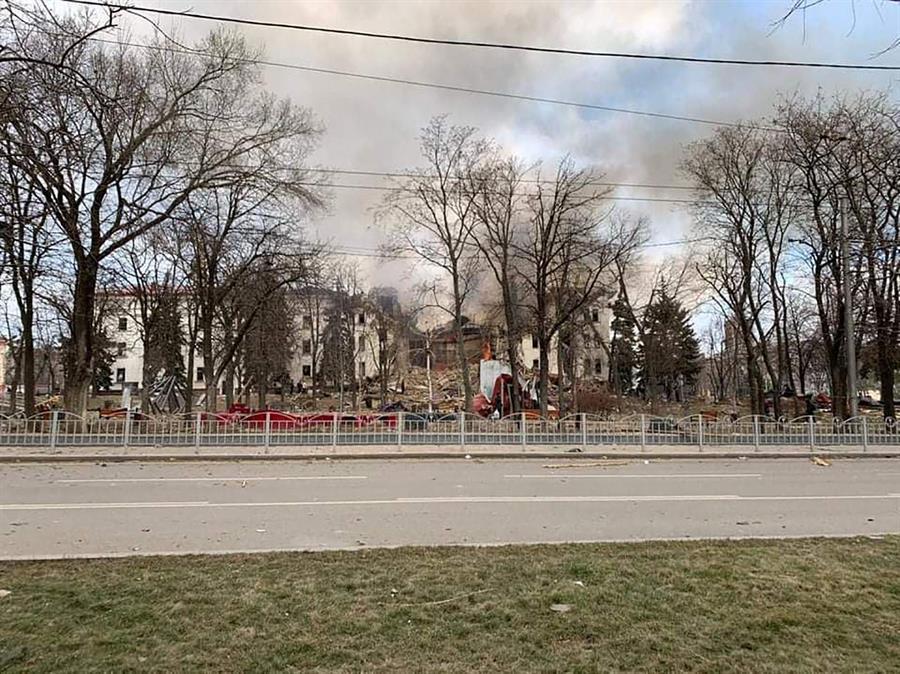
Rescue workers searched desperately for any survivors buried beneath the rubble of Mariupol’s bombed-out theatre Friday, as Russia’s forces pounded residential areas across Ukraine, stoking allegations of war crimes.
Twenty-four hours after Mariupol’s once-gleaming whitewashed theatre was hollowed out by a Russian strike, the number of dead, injured or trapped is still unclear.
Ukraine’s ombudswoman Lyudmyla Denisova said a bombshelter in the building had survived the impact, and some "adults and children" had emerged alive.
"Work is underway to unlock the basement," she said, amid fears that up to 1,000 people may have been taking refuge underground at the time of the blast.
The attack on a civilian building marked with the words "DETI", or "children" in Russian, has sparked a wave of international revulsion and heaped pressure on Russia’s few remaining allies -- most notably China -- to condemn Moscow’s apparent deliberate targeting of civilians.
A thick pall of grey smoke streamed across clear blue sky over Lviv’s airport in western Ukraine at 7:30 am Friday, an AFP reporter saw.
Armed checkpoints turned motorists back from roads into the airport, and a local witness told AFP he had heard a blast earlier Friday.
In a call later Friday US President Joe Biden is set to warn his counterpart Xi Jinping that Beijing will face "costs" for "any actions it takes to support Russia’s aggression," according to US Secretary of State Antony Blinken.
In the wake of the theatre attack, Blinken also said it was "difficult to conclude" that Vladimir Putin’s regime had not engaged in war crimes by targeting civilians.
Biden hoped China would use "whatever leverage they have to compel Moscow to end this war," the top US diplomat said.
Russia has routinely denied such allegations and the Ministry of Defence has said it did not strike any ground targets in Mariupol on the afternoon the theatre was hit.
It instead claimed Ukraine’s hardline nationalist Azov battalion, a frequent target of Russian propaganda, mined the theatre and held civilian hostages there in "a new bloody provocation".
Russia’s siege of the city -- cutting power, as well as many communications links and food supplies -- has closed access and made independent verification all but impossible.
Local officials say more than 2,000 people have died so far in indiscriminate shelling, and 80 percent of its housing has been destroyed.
"In the streets, there are the bodies of many dead civilians," Tamara Kavunenko, 58, told AFP after fleeing the city.
"It’s not Mariupol anymore," she said. "It is hell."
Ukrainian MP Sergiy Taruta said that Russian forces’ blockade of the city, killing of medics and destroying emergency equipment was stymying rescue efforts.
He claimed some people had emerged from the wreckage, but warned: "all those who survived the bombing will either die under the rubble of the theatre or have already died."
Italy’s minister of culture Dario Franceschini said his country was ready to rebuild the theatre "as soon as possible."
With stop-start peace talks ongoing, officials in Kyiv said Russia had agreed to nine humanitarian corridors Thursday for fleeing refugees, including one out of Mariupol.
As Russia’s ground advance has stalled under fierce Ukrainian resistance, Moscow has increasingly turned to air and long-range strikes to gain the upper hand.
According to Pentagon estimates, Russia has now fired over 1,000 missiles at Ukrainian targets since the war began three weeks ago.
In the early hours of Friday air raid alarms again rung in cities from Kyiv in the north to Odessa in the south and Kharkiv in the east.
Ukraine’s government listed a kindergarten and market in Kharkiv among the latest targets.
In his latest late-night video message, Ukrainian President Volodymyr Zelensky admitted the situation in several Ukrainian cities was "difficult."
But, he said, "we will not leave you behind and we will not forgive them. You will be free."
Hoping to sustain the fight, he has beseeched allies for more assistance -- even as an arsenal of anti-tank and anti-aircraft missiles flood into the country.
Slovakia confirmed it is willing to provide powerful Russian-made S-300 anti-aircraft missile system to Ukraine, but only on the condition that it receive a substitute from NATO allies.
On Wednesday Zelensky told German lawmakers that Russia was throwing up another "Berlin Wall", a dividing line between "freedom and bondage" in Europe.
"And this wall is growing bigger with every bomb," he added.
That dividing line is currently drawn around 15 kilometres from Kyiv, where Russian troops are still trying to surround the capital in a slow-moving offensive.
On Wednesday AFP journalists witnessed Ukrainian and Russian forces trade shell and rocket fire to the northwest of the city.
Civilians ran for cover as shelling set fire to a building near a warehouse.
Inside the warehouse’s car park, a Ukrainian soldier carrying a rifle ran in a crouch as gunshots crackled through the air.
A man carried a prone child in his arms into a nearby block of flats, and at least five ambulances raced towards the scene.
In Odessa, on the Black Sea, civilians were bracing for attack, with tanks deployed at intersections and monuments covered in sandbags.
"Our beautiful Odessa," said Lyudmila, an elegant elderly woman wearing bright lipstick, as she looked apologetically at her city’s empty, barricaded streets.
"But thank God we are holding on! Everyone is holding on!"